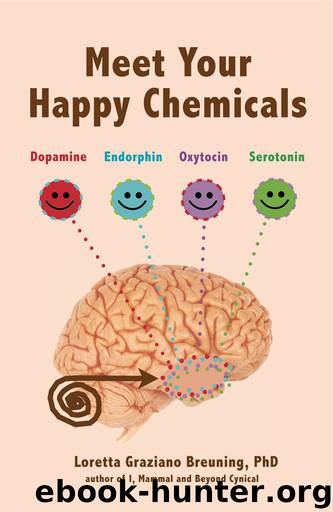Meet Your Happy Chemicals: Dopamine, Endorphin, Oxytocin, Serotonin by Breuning Loretta Graziano

Author:Breuning, Loretta Graziano [Breuning, Loretta Graziano]
Language: eng
Format: epub
Publisher: CreateSpace Independent Publishing Platform
Published: 2012-02-14T00:00:00+00:00
2. Neurons Atrophy from Lack of Experience
Your brain started pruning itself at age two. Neurons that weren’t used began to wither. Surprisingly, this stimulates knowledge. It helps a toddler use the circuits he’s already built instead of spreading his attention around the way a newborn does. A toddler focuses on things that felt good or bad to him in the past, and those circuits build.
The brain does much of its pruning between ages two and seven. This helps a child to link new learning to his existing circuits instead of building lots of separate circuits. Richly interconnected networks are much more useful in making sense of the world.
By the time you are seven, you are good at seeing what you have already seen and hearing what you have already heard. You may think this is bad, but the value is clear if you think about how easy it is to lie to a six-year old. If you tell the same lie to an eight-year old, he will question it. He compares what you tell him to his life experience. If there’s no fit, he’s able to trust his own mental representation of the world instead of yours. This had tremendous survival value in a world where parents often died young and children met their own survival needs.
When you were young, some of your neurons were swept away like autumn leaves, which streamlined your thought process. You kept adding new knowledge, of course. But you focused on things relevant to your old knowledge. You tended to shy away from things completely unconnected to your past experience, because they were hard to process. When electricity speeds through your circuits, you have the feeling you know what is going on. When you see things unrelated to your prior experience, little electricity is triggered, so you have little confidence in your information.
Unfamiliar inputs are not connected to your neurochemicals, so it’s hard to judge if they’re “good for you” or “bad for you.” Your brain is motivated to see the good and avoid the bad, so it focuses on inputs relevant to those goals. As a result, you keep developing connected neurons and not developing others. Some neurons atrophy because they haven’t become relevant to your survival.
Download
This site does not store any files on its server. We only index and link to content provided by other sites. Please contact the content providers to delete copyright contents if any and email us, we'll remove relevant links or contents immediately.
Periodization Training for Sports by Tudor Bompa(8253)
Why We Sleep: Unlocking the Power of Sleep and Dreams by Matthew Walker(6706)
Paper Towns by Green John(5179)
The Immortal Life of Henrietta Lacks by Rebecca Skloot(4576)
The Sports Rules Book by Human Kinetics(4379)
Dynamic Alignment Through Imagery by Eric Franklin(4208)
ACSM's Complete Guide to Fitness & Health by ACSM(4057)
Kaplan MCAT Organic Chemistry Review: Created for MCAT 2015 (Kaplan Test Prep) by Kaplan(4008)
Introduction to Kinesiology by Shirl J. Hoffman(3766)
Livewired by David Eagleman(3764)
The Death of the Heart by Elizabeth Bowen(3610)
The River of Consciousness by Oliver Sacks(3599)
Alchemy and Alchemists by C. J. S. Thompson(3515)
Bad Pharma by Ben Goldacre(3422)
Descartes' Error by Antonio Damasio(3270)
The Emperor of All Maladies: A Biography of Cancer by Siddhartha Mukherjee(3148)
The Gene: An Intimate History by Siddhartha Mukherjee(3094)
The Fate of Rome: Climate, Disease, and the End of an Empire (The Princeton History of the Ancient World) by Kyle Harper(3055)
Kaplan MCAT Behavioral Sciences Review: Created for MCAT 2015 (Kaplan Test Prep) by Kaplan(2984)
